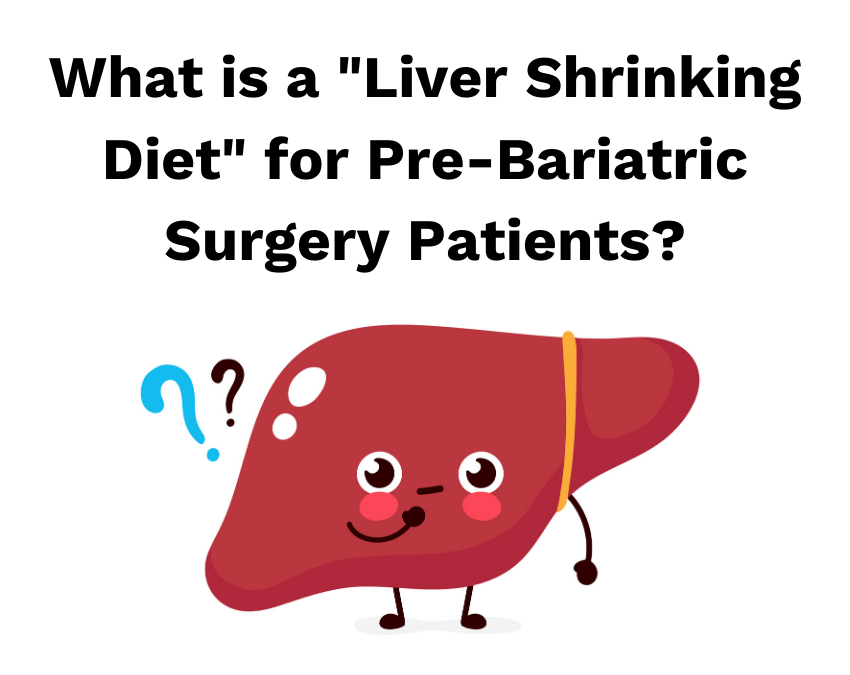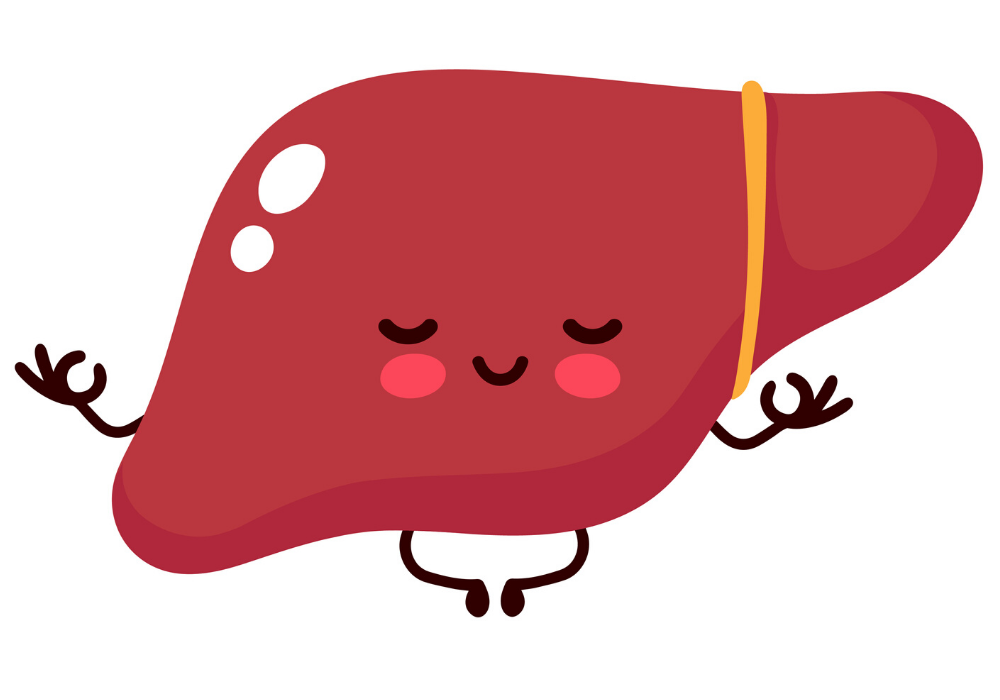ENTER YOUR EMAIL ADDRESS TO UNLOCK
15% OFF
on your first order
Some exclusions apply.
The liver also processes a large amount of the compounds from the food you eat, and these have important implications on the overall health of the organ.
Why a liver shrinking diet is prescribed
When it comes to weight gain, the demand on the liver increases, which can cause fatty tissue to accumulate in and around the liver tissue. Research shows that 65% of those with a BMI of 30.0–39.9 and 85% of those with a BMI of 40 and above are likely to have some degree of fatty liver.
When the liver increases in size, it adds a level of complexity to bariatric surgery as the liver is located just to the right of the stomach. Even though the liver normally covers a part of the stomach when you lie on your back, a larger, more fatty liver can make it even more difficult for the surgeon to access the stomach to perform the procedure.
It is not uncommon for a surgeon to have to postpone a surgery by an additional two weeks if a patient has not been able to successfully follow the liver shrinking plan, as it may be too unsafe to complete the procedure under the risky conditions that a significantly enlarged liver presents.
The liver shrinking diet is therefore necessary, not only to allow for improved access to your stomach during the surgery, it has also been shown to reduce the risk of complications as a result of the surgery.
Fortunately, the liver is a very smart organ and, once a strict diet is followed, the fat that the liver contains shrinks fairly quickly, which makes for a safer surgical experience overall. The liver shrinking diet also provides a great opportunity to get used to the type of eating plan that you will follow for the first weeks after your surgery.
Why does the liver grow in the first place?
The liver is really a phenomenal organ. Not only does it process blood and detoxify a range of compounds, but it’s also a major storage site for energy storage. This energy storage system ensures that the moment the body needs extra energy, and it has used up the supplies in the blood and muscle, easy access to fuel is available.
Now, picture a fridge for a second. When you go grocery shopping, you pack your perishables away and spread them across the shelves. If your partner goes grocery shopping at the same time, and brings home more perishables, there won’t be enough space in the fridge and the items bought will need to be packed into the freezer. If a friend comes over and delivers more groceries, these items will spill over onto the counters in your kitchen.
The liver is the freezer in this scenario, and the fatty tissue that accumulates is the spillover of groceries onto the counter and into the cupboard shelves.
When you follow the liver shrinking diet, it’s just like setting up a meal plan where you make sure to eat the food that will help to resolve the problem instead of buying more groceries and continuing to add to the issue.
What’s the purpose of the liver shrinking diet?
The liver shrinking diet is a very low calorie diet that is designed to quickly, but safely, lose a lot of weight and push the liver into burning the fat it contains, causing it to shrink . While you won’t be able to physically see the different in the size of your liver by looking at your abdomen, if you’re following your pre-operative diet and you’re losing weight overall, it’s a good sign that the liver is getting into shape , too.
Key considerations of the liver shrinking diet
Even though the liver shrinking diet is low in calories, the types of calories you consume when following the plan, are important.
The Liver and Carbohydrates
One of the main reasons the liver swells in the first place is because of a diet that is too high in carbohydrates. Excess carbohydrates in the diet are processed through the liver, and they are either stored as a variation of carbohydrates in a form of stored energy called glycogen, or they are converted for preparation to be stored more long term, into a compound called a triglyceride.
This is especially true for the type of sugar we often find in our food , called fructose.
Now, the word triglyceride may already seem familiar to you, as it should. Triglycerides form part of your total cholesterol count, and along with the LDL cholesterol – often called bad cholesterol – triglycerides are one of the numbers your doctor will generally give you feedback on if the number is too high.
Triglycerides can either be released back into the blood or they can be stored as lipid droplets, which may go on to contribute to fat cell accumulation, or they remain in the liver, contributing to the fatty accumulation in and around the organ.
That’s why the very first point to take note of for the effectiveness of the liver shrinking diet, is how low it is in carbohydrates overall. When you restrict your intake of carbohydrates, this fatty acid process is less likely to take place, and so the body is able to use up this excess energy, which allows the liver to shrink.
The Liver and Dietary Fats
Fats are another important consideration when following the liver shrinking diet. Because fats are higher in calories, they’re generally limited on the eating plan to ensure the low calories goals are able to be achieved. Some forms of dietary fats, particularly saturated fats, also contribute to the fatty deposits in the liver, which is why the plan is low in carbs and low in fat.
It is, of course, essential to keep your body functioning optimally throughout the process of promoting liver shrinkage, which is where protein comes in.
The Liver and Protein
Not only is protein an essential nutrient that contributes to many of the chemical reactions the body performs every day, higher intakes of protein have been shown to be particularly helpful in reducing fatty liver along with improving metabolic profiles in those with diabetes or metabolic syndrome. Higher protein intake, even through supplementation using whey protein powder , for example, has even been shown to improve the effect of a high fat diet on the accumulation of fats in the liver , and the highest success in reducing fatty liver has been seen in high protein, low carbohydrate diets1.
Protein should come from lean sources of protein such as poultry and protein supplements to ensure an adequate amount is consumed, without additional concern for whether there are too many carbs or fats associated with the foods.
Your Pre-Bariatric Surgery Liver Shrinking Diet
The pre-op diet is limited to 800 calories and is specifically designed to get you into the best shape you can be in to have the surgical procedure performed, with the best possible outcomes. This very low calorie diet has a significant impact on weight loss and liver health.
There are many considerations to take into account when following an 800 calorie food plan. Of course, the main goal of following such a low calorie diet is to promote weight loss, however, the body needs an array of nutrients to continue to be able to function. For this reason, it is important to consider taking supplemental nutrients while following the liver shrinking diet.
While most pre-op liver shrinking diets will have you follow the low calorie eating plan for around 2 weeks, it really depends on your BMI.
Here’s a rough estimate of the time you may need to follow the eating plan:
BMI < 38: while you don’t need to follow the diet, you will need to have only liquids 2 days before surgeryBMI 38 – 39.9: One Week BMI 40 – 44.9: Two Weeks BMI 50 – 49.9: Three Weeks BMI > 50 : Four WeeksThis is what that diet will look like.
Liver Shrinking Diet Bundles
Bari Life provides every essential you need for the duration of your pre-op diet.
For each day, the plan is specifically tailored to help you to reach the 800 calorie goal, which includes 6 portions of protein and 1 serving of a complete vitamin formula for each day. Each item on the plan is low in carbs and low in fat, but provides you with that essential protein you need to promote your liver to shrink.
If you follow the program as set out for you, the average person can expect to lose between 6-10lbs per week.
Included in the bundles are great-tasting, low calorie foods that have been provided in the exact portion sizes as required for the number of weeks you’ll follow the plan.
For the 1-week plan , for those with a BMI of 38 – 39.9, you’ll receive:
1x Maple Brown Sugar Protein Oatmeal
For the 2-week plan , for those with a BMI of 40-44.9, you’ll receive:
2x Maple Brown Sugar Protein Oatmeal
For the 3-week plan , for those with a BMI of 45-49.9, you’ll receive:
2x Apple Cinnamon Protein Oatmeal
For the 4-week plan , for those with a BMI of 50 and over, you’ll receive:
3x Maple Brown Sugar Protein Oatmeal
The Bottom Line on the Liver Shrinking Diet
By following these specifically laid out eating plans, we’re helping you to remove the guesswork out of what to eat; all you need to do is consume what is designated, spread across the day, and the weight will come off. Your liver will shrink and you’ll be in a far better position to undergo the bariatric procedure, with far better outcomes for long-term success.

